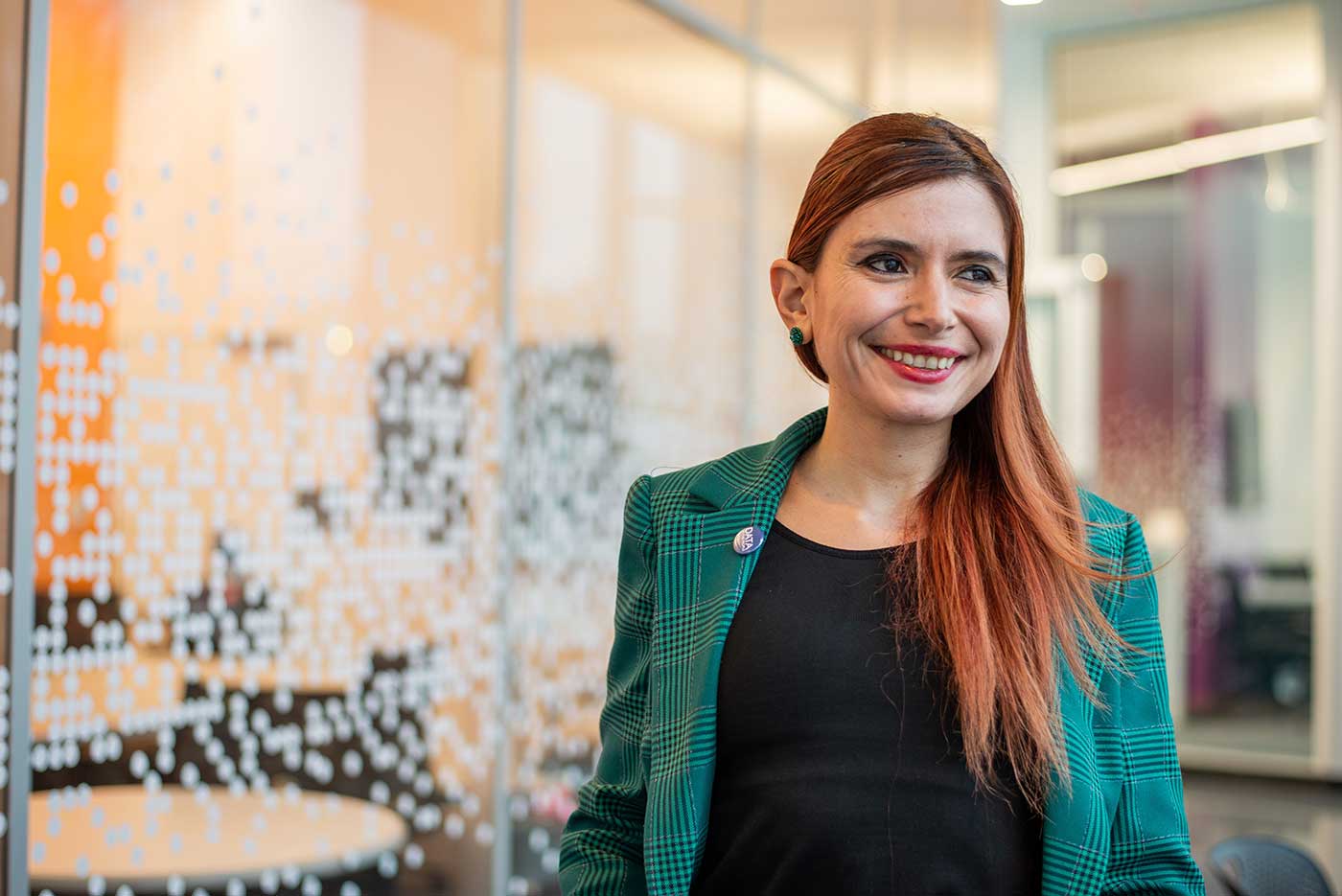From Boston Mayor Wu’s office to the global stage, Saiph Savage centers humans in computing
Author: Madelaine Millar
Date: 07.19.23

Presenting to the mayor’s office on the future of AI. Helping to launch an international misinformation panel at the Nobel Prize Summit. Working to organize the world’s top conference on crowdsourcing research.
For Saiph Savage, Khoury College assistant professor and director of the Civic A.I. Lab, it all happened in just one month. Amid rising worldwide interest in online misinformation and the role of AI in government, her work at the intersection of crowds, labor, and artificial intelligence is of growing relevance. Fueled by her motivation to center real people’s living conditions in the tech world, Savage is using computational tools to work towards greater equity in the information age.
One person who’s interested in the future of artificial intelligence is Boston’s mayor, Michelle Wu. She’s looking into ways to thoughtfully shape the city’s use of AI, and in May, she invited Savage to present on her years working with the Mexican federal government on the country’s National Digital Strategy and designing human-centered AI systems for the local and federal governments. The goal: find out more about what works and what doesn’t.
“My research matched a lot about what the mayor was interested in, in terms of using AI not to replace government employees, but rather make their work more effective, fulfilling, and creative,” Savage said.
During the presentation, she provided an impressive example of her involvement in creating an intelligent interface in Mexico City. The interface helped government social workers direct their attention and resources to provide enhanced support to victims of domestic violence and improve strategic planning for follow-up actions to aid the victims.
Savage welcomed members of Wu’s staff to her breakout session at Khoury College’s culminating 40th anniversary event on May 16, where they discussed the need to develop civic tech for underserved populations. Now she’s planning additional conversations with the mayor’s office and exploring the potential for further collaboration, and she expressed excitement at uniting forces with other faculty on this front.
A week and a half later and 400 miles south, Savage attended the Nobel Prize Summit in Washington, DC, to take part in the public unveiling of the International Panel for the Information Environment (IPIE). Inspired by the UN’s Intergovernmental Panel on Climate Change, the IPIE is a group of 200 experts from 55 countries aiming to craft evidence-based recommendations for fighting misinformation online. The IPIE was covered in the New York Times for its work “not fact-checking individual falsehoods but rather looking for deeper forces behind the spread of disinformation as a way to guide government policy.”
Savage leads the IPIE’s membership panel, working to ensure that the group’s contributing experts represent a diverse array of perspectives from around the globe. That way, the panel’s recommendations can be as accurate and applicable as possible.
”One way in which disinformation thrives is that it can adapt to different cultures, so you might be creating mechanisms for combating disinformation that might not work under different contexts,” Savage said.
Given her research interest in crowds, Savage is particularly interested in how to organize the IPIE’s 200-something members as effectively as possible, because “if you include researchers from different regions, they can provide you with better context about what might be happening in their region and you can create more culturally aware mechanisms to combat disinformation.”
Savage isn’t just working on her own projects; she’s also looking for ways to lift up the voices of other researchers studying human–computer interaction (HCI) and crowds. She is co-chairing HCOMP, an annual conference in the Netherlands that serves as the premier venue for human computation and crowdsourcing research. Although the conference itself won’t take place until November, Savage has spent months gathering papers, and she’s eagerly anticipating seeing her fellow HCI researchers’ work.
“Industry focuses a lot on productivity and metrics that might bring the company money,” Savage said. “As a professor, you have the opportunity to think about another type of research that is more worker-centric, and this gives you the opportunity to innovate in a space where maybe fewer people are, and where industry is not as interested.”
Through all of this conversation and coordination, Savage has kept her own teaching and research efforts going too. After her team’s paper “Quantifying the Invisible Labor in Crowd Work” won the Impact Award at ACM’s cooperative work and social computing conference two years ago, she expanded the research to computational tools that help other gig workers like Uber drivers get insights into their work and organize more effectively. She also won a $69,000 grant from the digital identity credentials company ID.me to study the design of more racially aware facial recognition systems, work she will pursue with her PhD students and research lab. She is teaching classes on human-centered AI and culturally aware computer systems this fall for students intrigued by this line of work.
As her areas of research expertise step further into the global spotlight, Savage can be relied upon to find innovative ways to center people in computation.
“I’m very interested in thinking about how we design interfaces that help workers to achieve their goals, which might be different from the goals that industry has,” Savage said. “There’s a lot of opportunity in designing for the things that industry might not look at.”
Subscribe to Khoury News
The Khoury Network: Be in the know
Subscribe now to our monthly newsletter for the latest stories and achievements of our students and faculty